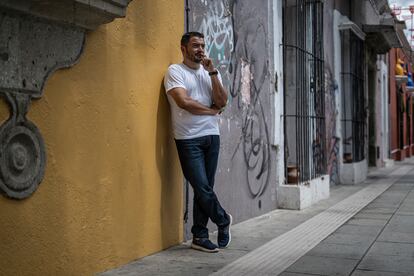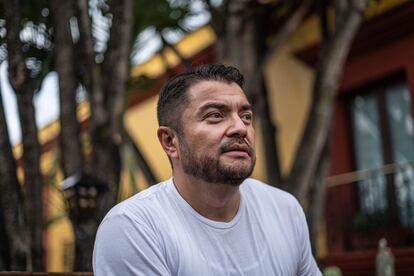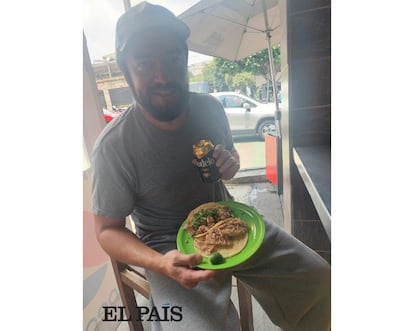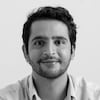Héctor Alejandro Cabrera Fuentes, the scientist accused of espionage: ‘If I were to talk about everything I’ve seen, nobody would believe me’
The Mexican microbiologist speaks exclusively to EL PAÍS for the first time since his release from prison in the US. Cabrera Fuentes affirms that he isn’t the ‘monster’ that the media has made him out to be. He also says that he’s ready to resume his career and possibly get into politics

A man who lived a “double life.” A “collaborator” working for Vladimir Putin. A “spy.” Héctor Alejandro Cabrera Fuentes’ life changed forever in February of 2020, when the United States accused him of acting as an agent for the Kremlin and spying on a high-level intelligence source. The scandal paused the meteoric rise of the Mexican scientist.
The situation became even more inflamed after it was revealed that he had two families: the American authorities alleged that Moscow had taken advantage of this situation to pressure him and force him to collaborate. After spending three-and-a-half years behind bars and losing almost 90 pounds, Cabrera Fuentes has finally broken his silence, speaking out for the first time since his release from prison. “If I were to talk about everything I’ve seen, nobody would believe me,” he says, in an exclusive interview with EL PAÍS.
“Perhaps if [I had been] told 41 months ago that I was going to survive prison in the US, I wouldn’t have believed it, either… I would answered that I would have committed suicide before [being jailed]. These were the kinds of thoughts that came to me at first, because you don’t know what’s coming, you don’t know what’s going to happen,” he explains.
Now that he’s back in his country, the 38-year-old microbiologist is ready to resume his life – and he’s not closing the door on getting into politics. “I hope that I’m the next [Nelson] Mandela, who gets to make generational changes. Why not? How many presidents have come out of prison?”
“My reason for living is – and will continue to be – science. But if I can obtain a government position, in which I can support society, I would do it without thinking twice,” he shrugs.
Cabrera Fuentes arrives for the interview in Oaxaca – the capital of his home state – wearing a white T-shirt and sunglasses. He looks around cautiously. “This is the first opportunity I’ve had to talk about what has happened to me. I want to take advantage of [this interview] to clarify [how some things] have been handled,” he says, in a reflective tone. “The truth is, there’s a lot of fiction in everything that has been said [about me]; nothing that has been written has come from me, almost everything is speculation,” he emphasizes, after letting out a nervous laugh.
The eldest of three brothers from a family of Zapotec Indigenous origin, he describes himself as a scientist who has dedicated his career to supporting his community in El Espinal, a small town with fewer than 10,000 inhabitants: “I’m a human being who, despite what happened, has a new opportunity in life and is here to face it.”
— How different is the Hector you’ve read about from the one you say he is?
“They are two totally different people. I’m being reborn, I just got out of jail and I have to accept [the situation as it is]. I adapted and survived. It’s something I’ve done my whole life. I’m presented as being a ‘trained spy’ or something… but my only training is being a scientist. I’m someone who struggled to be a scientist. I come from a town in Oaxaca and I think that’s part of what has caused a lot of sensationalism in my case.”
In mid-February of 2020, Cabrera Fuentes, his wife, and their two children traveled from Mexico City to Miami. After spending a few days there, they packed their bags to take the return flight. “It was a normal day: we arrived at the gate, we were doing some shopping and, when we were about to board, [the officers] questioned us,” he recalls. FBI agents detained the couple for separate questioning.
The judicial file reads that the scientist had approached a parking lot to take photographs of a vehicle, identify its license plate and detailing the location. His arrival drew the attention of the building’s security guards, who asked him what he was doing there and told him to leave. Agents found the images in a WhatsApp conversation and in the “recently deleted files” folder on his phone. After hours of uncertainty, Cabrera Fuentes admitted that he had taken the photographs – he decided to stay in the United States to clear up the mess, in exchange for allowing his family to return to Mexico. “I told them that nothing was going to happen and that I would arrive soon,” he says.
— Why did you decide to turn yourself in?
“Because of the fear of what could happen to my family.”
— What was going through your mind at that moment?
“I was nervous. You find yourself in an unknown situation, difficult to describe and understand.”

It all happened in a matter of days, according to the US authorities. On February 14, the incident in Miami occurred; the interrogations began on the 16th and, on the 18th, the arrest was announced. The first hearing before a Florida judge was also held on February 18, flooding news outlets on both sides of the border. By February 28, Cabrera Fuentes was formally charged with “acting as an agent of a foreign government” – a charge that could carry up to 10 years in prison. Another five years could be added, if it was proven that he had conspired to commit an offense against the United States.
During that period, court documents revealed that the scientist had another wife and two daughters of Russian origin, who were prevented from leaving Russia. An official promised to help them get out… but only if Cabrera Fuentes carried out intelligence tasks. “We can help each other,” the officer told him, according to US authorities, who say that the collaboration began in March of 2019. Several parts of this story cannot yet be revealed.
“Everything is narrated from [their] point of view. What I can say is that it wasn’t a double life… given the circumstances, I was making decisions at different stages of my life,” says Cabrera Fuentes. The scientist maintains that there was an obsession with taking some aspects of his personal life out of context and that the relationships were conducted “on normal terms.”
“Maybe I made a mistake, but it bothered me a lot how everything was handled in the media, because they not only damaged my person; they also damaged my children and people in my close circle, who suffered through this ordeal with me and who – despite everything – supported me until the end.”
The town of El Espinal wasn’t exempt from controversy. Practically the entire town defended the man who they consider to be a local hero. They remembered that he had built a prototype of new houses for those affected by the 2017 earthquakes, that he paid for trips out-of-pocket to support low-income students and that – just a few months before his arrest – he had worked with some of the best scientists in his field and dreamed of winning a Nobel Prize.
Demonstrations were organized in the town; friends and family collected money for his defense, while local politicians came out to support their prodigal son. “If nobody had given me a chance, I would never have been able to transcend [my circumstances], no matter how much I would have dreamed and wanted it. That’s what I’ve tried to give back to my community – I think they have supported me for that,” he reflects.
The case went viral. Without realizing it, El Espinal became trapped in a storyline that seemed to come out of the Cold War, when the two superpowers waged a geopolitical battle. “I felt trapped in something that was much bigger than me. It was a very sensitive case and, at the same time, due to the relevance of the case, I came to think that what I felt and my opinion didn’t matter to anyone.”
A rumor began to spread that Cabrera Fuentes was risking a life sentence if he didn’t plead guilty. “It was one of the things that hit me the most,” he admits. “Inside, I had seven minutes on the phone to convince my family that I wasn’t the monster everyone said I was [and that I wasn’t] going to spend the rest of his life in prison.” After turning himself in, the researcher pleaded not guilty, even though admitting his guilt would have resulted in a speedier trial.
“They repeated [this option] so much that, at one point, it also entered my head and I began to question myself: could it be that I would really spend the rest of my days locked up?” he admits.
— How were the first hours in jail?
“Probably the worst moments of my life. I entered a dungeon at dawn – they threw me a sheet to lie on the floor and my whole life passed through my head in a few minutes.”
— What did you see?
“All the bad and all the good that I’ve done. No one plans to set foot in a jail.”
Everything seemed to have collapsed. Cabrera Fuentes – a prominent scientist, who achieved his position against all odds – became international news. People such as César Duarte – the former governor of the Mexican state of Chihuahua, from the PRI – were also held in the Miami Detention Center. Other high-profile detainees include drug trafficker Édgar Valdez Villarreal – alias “La Barbie” – and Alex Saab, designated by the US as the main money-launderer of the Maduro regime. Another notorious figure is Enrique Tarrio – leader of the neo-fascist Proud Boys – according to prison records. “That prison is a kind of limbo, because people accused of very serious crimes pass through it… but in many cases, it hasn’t been determined if they’re guilty or not,” he comments.
Locked up in a high security unit, Cabrera Fuentes took little time to understand a simple world of rigid rules and repetitive routines: cells open at six in the morning and a count is made at four in the afternoon. They’re reopened an hour later and they close again, at nine o’clock at night. But there are also unwritten rules which he was able to follow, thanks to one of his cellmates – a man who had been behind bars for more than 20 years.
“The only thing that frees you is [being able to adapt] to the system. You learn that the two most important things in a prison are respect and loyalty. Being disloyal can cost you dearly,” he warns. A couple of weeks later, while he was cracking that system, the COVID-19 pandemic broke out in the US. Lockdowns began on March 12 – his simple prison world was suddenly reduced even further, to a cell measuring 36 ft²: a bunk, a toilet and a table. During the pandemic, he could only get out of those four walls for 10 minutes every 72 hours.

— What’s it like to spend three days in a row with a highly dangerous prisoner?
“Terrible. But you have to have respect and not interfere in the lives of others. Deep down, we were all afraid of our cases and we were very careful about what we said. It’s well known that, oftentimes, someone can listen to you and obtain a benefit for their case, by testifying against you. You can never let your guard down, but you find ways to survive. You also learn a lot: some [prisoners] have brilliant minds. It’s the most innovative world I’ve ever been in. I learned things that no university can teach you.”
“What you see in the movies [cannot compare],” he says, referring to the gang wars, the lawsuits, the madness and the endless ramblings of those who lose their freedom. The pandemic caused deaths inside the prison; it also paralyzed the courts and cut off contact with the outside world. Cabrera Fuentes learned to cook with a nail clipper, a garbage bag and a couple of wires, so that he could eat hot food. He would read for hours to exhaust himself and not give in to doubt. Outside, normality gradually gained ground. The pandemic ended and the drums of war began to beat again in Eastern Europe.
Just before the war in Ukraine broke out, Cabrera Fuentes pleaded guilty to the charge for acting as an agent of a foreign government on February 15, 2022 – almost two years after he was arrested and nine days before Russia’s invasion began. The scientist says that he was aware of the conflict and thinks that it’s likely that the war could have influenced his case. He explains that the pandemic delayed his legal process for two years, which prevented the evidence from being analyzed in time and reduced contact with his team of lawyers. “I had a lot of time to reflect on the mistakes I made and how I could become a better person,” he admits.
It was half-a-year later when the scientist stepped into a courtroom to learn his fate. He appeared handcuffed, with his teeth shackled: he asked for mercy for the last time. There was already an agreement with the Attorney General’s Office, but everything was in the hands of the judge, who could reject the arrangement and dictate the sentence that he considered most appropriate. “Those were the five scariest minutes I have ever experienced. But I still didn’t lose hope of being set free,” he remembers. Ultimately, he was sentenced to four years and one day in jail, on June 21, 2022.
Cabrera Fuentes went through three prisons and gradually climbed the task ladder: he cleaned bathrooms, floors and dining rooms; he was responsible for managing inventories and was put in charge of distributing food. He also says that he maintained contact with his former colleagues and sought to continue with research projects that were pending. “I can proudly tell you that I continued to publish in [peer-reviewed] journals from prison,” he says.
The Federal Bureau of Prisons reduced his sentence by 15% due to his good behavior. Because of this – and in addition to time served while awaiting trial – he was released on July 14 of 2023, according to prison records. “Spy, spy, you’re leaving now, spy!” the inmates yelled at him as he walked out. He says that the nicknames they gave him never bothered him: The Professor, The KG [referring to the KGB], The Spy. A day later, he landed and was eating tacos in Mexico City. “At that moment, all my suffering was erased; everything was over and I understood that something new was beginning, that I had to adapt again,” says the researcher, euphoric and liberated.
— Are you afraid of any reprisal?
“No, I’m calm. I was arrested, I went through a process, I was punished and I took my punishment. Today, I have another chance. Labels don’t bother me. I have always tried to be myself.”
Cabrera Fuentes affirms that the three years of probation that he’s still under won’t be an obstacle to resuming his professional career. He claims to have several job offers and invitations to conferences in Asia and Europe. He sees himself spending the next few months outside of Mexico, unless a possibility materializes at a local university. Cabrera Fuentes may even attempt to become the municipal president of his town – a position that he’s flirted with in the past.
“There will be time to fill in the gaps that remain in the story before turning the page,” he concludes. For now, the scientist just craves a dose of normality. Moments after his interview, he puts on his sunglasses again and disappears into a crowd that doesn’t recognize him, walking the streets of the city that he was separated from for 1,246 days and nights.
Sign up for our weekly newsletter to get more English-language news coverage from EL PAÍS USA Edition
Tu suscripción se está usando en otro dispositivo
¿Quieres añadir otro usuario a tu suscripción?
Si continúas leyendo en este dispositivo, no se podrá leer en el otro.
FlechaTu suscripción se está usando en otro dispositivo y solo puedes acceder a EL PAÍS desde un dispositivo a la vez.
Si quieres compartir tu cuenta, cambia tu suscripción a la modalidad Premium, así podrás añadir otro usuario. Cada uno accederá con su propia cuenta de email, lo que os permitirá personalizar vuestra experiencia en EL PAÍS.
¿Tienes una suscripción de empresa? Accede aquí para contratar más cuentas.
En el caso de no saber quién está usando tu cuenta, te recomendamos cambiar tu contraseña aquí.
Si decides continuar compartiendo tu cuenta, este mensaje se mostrará en tu dispositivo y en el de la otra persona que está usando tu cuenta de forma indefinida, afectando a tu experiencia de lectura. Puedes consultar aquí los términos y condiciones de la suscripción digital.









































